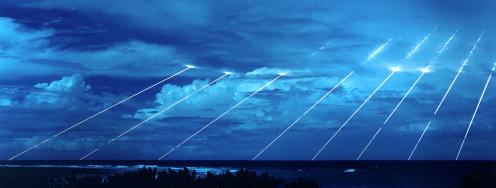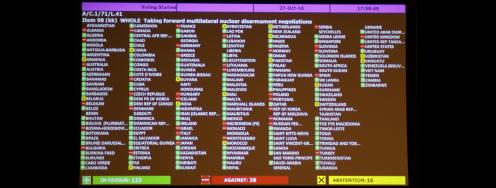Sen. Feinstein: U.S. Nuclear Arsenal Oversized, Unsustainable
On the radar: Aligning nuclear budgets with strategic realities; What sanctions supporters really want; Limiting Iran’s R&D; Restocking nukes is a terrible idea; Nuclear budget gimmicks; Lingering effects of nuclear testing; and Haunting photos of a Soviet nuke base.
On the radar: Aligning nuclear budgets with strategic realities; What sanctions supporters really want; Limiting Iran’s R&D; Restocking nukes is a terrible idea; Nuclear budget gimmicks; Lingering effects of nuclear testing; and Haunting photos of a Soviet nuke base.
December 4, 2014 | Edited by Will Saetren
Unnecessary and unsustainable - “We’re holding far more nuclear weapons than are necessary, and the cost is undermining other national security priorities. It’s time we take a long look at how we can responsibly reduce our stockpile,” writes Sen. Dianne Feinstein (D-CA) in the Washington Post. “Put simply, the current level of spending on nuclear weapons is unnecessary and unsustainable.”
--Sen. Feinstein says the 3,200 spare warheads kept in reserve are an easy place to cut. “We can reduce these reserve weapons without the painstaking task of negotiating further arms-control treaties. We can do so without negatively affecting our national security or our global deterrence. And doing so could save hundreds of millions of dollars a year.” Read the full column here. http://wapo.st/1rULbQE
Honesty - Some members of Congress claim to support new sanctions because they want the Iran talks to succeed. Senator-Elect Tom Cotton (R-AK) is more direct. “I hope that Congress’ role will be to put an end to these negotiations. Iran is getting everything it wants in slow motion so why would they ever reach a final agreement?” Cotton said during a roundtable with reporters. Other members of Congress are openly talking plans for airstrikes in Iran. ABC News has the quotes. http://bit.ly/1vQkYkp
Tweet - @WinWithoutWar: MT@FCNLworld: Check out list of members of Congress who have made #Iran pro-diplomacy statements: #DiplomacyWorks http://bit.ly/1I4CGqR
Sanctions hawks - “Congressional hawks are struggling to build a veto-proof majority for new Iran sanctions despite wide discontent among lawmakers over the lack of progress from more than a year of nuclear talks with Iran,” writes Bradley Klapper for the Associated Press.
--“President Barack Obama has threatened to veto any new sanctions legislation while American diplomats push for an accord. Sanctions proponents thus need 67 votes out of 100 in the Senate, and administration officials have been lobbying furiously to keep them below that threshold.” Read the full story here. http://abcn.ws/1Bh44jt
Tweet - @lrozen: 11/26 CRS report on the interim #Iran nuclear deal and P5+1 #Irantalks on a comprehensive accord. http://t.co/r5WbWRVn2F
R&D restrained - Under the extension of the interim deal, Iran has agreed to a key additional concession: refraining from testing more advanced centrifuges. "The new restrictions more fully implement the spirit of Iran's commitment ... to not engage in any R&D activities that could advance its nuclear program during the course of this interim agreement," explained an unnamed analyst. Fredrik Dahl has the full report for Reuters. http://reut.rs/1rZMU1B
Reduce, don’t restock - “Restocking the U.S. nuclear stockpile is a terrible idea,” write several arms control experts in response to a recent Los Angeles Times article featuring support for building new nuclear weapons.
--”The United States does not need new nuclear weapons...the United States has a multibillion-dollar program to refurbish existing warheads to ensure they remain reliable for decades to come. It should continue with this refurbishment strategy, not design and produce new weapon types, which would be needlessly provocative and could introduce greater uncertainty about reliability,” writes Lisbeth Gronlund. More letters to the editor here. http://lat.ms/1tK9600
Tweet - @CoreyAH: Big announcement by @Gottemoeller in Prague, "a new initiative: the International Partnership for Nuclear Disarmament Verification"
Leaving the waste behind - The Army is seeking to end its federal Nuclear Regulatory Commission license at Jefferson Proving Ground in Southern Indiana, “leaving an estimated 162,040 pounds of depleted uranium projectiles and thousands of unexploded artillery shells at the firing range” writes Charlie White for the The Courier-Journal. “‘The Army never thought much about the future,’ said Mike Moore… who worked at the site for the Army until 1994. ‘They just wanted to test the ammunition. ... No thought was given that you've ruined this land forever.’" Read the full story here. http://cjky.it/1yKyacT
Reining in the Pentagon - “Unfortunately the administration seems to be taking a step away from budget discipline even as it brings in new blood at the Pentagon,” writes William Hartung for Roll Call. “Press reports have indicated that the fiscal 2016 budget that will be released next February will seek a Pentagon top line that is up to $60 billion higher than the caps set by current law.”
--Out of control nuclear projects are a big part of the Pentagon’s budget bloat. The Navy wants to build 12 new nuclear submarines at a total cost of $100 billion, taking the money from the other services’ budget to cover their own shortfall. “But this is just a budget gimmick that will do nothing to make the Pentagon’s total procurement plans more affordable.” Full article, including other areas of defense waste, here. http://bit.ly/1yjjClA
Come clean - “The UN General Assembly approved an Arab-backed resolution calling on Israel to renounce possession of nuclear weapons and put its nuclear facilities under international oversight,” reports the Associated Press. Read the full story here. http://aje.me/1w1oM5M
Nuclear coral - “The coral atoll of Enewetak in the Marshall Islands...stands out for its misfortunes.” As Michael Gerrard writes in The New York Times, the site of 67 open air nuclear weapons tests “is likely to be submerged by rising seas or torn apart by storms, releasing its radioactive poison into the ocean and compounding the legacy our advanced civilization has left to this tiny island nation.” Read the column here. http://nyti.ms/1zoAc0C
Quick Hits:
--”North Korea Is Asia’s Biggest Security Threat, U.S. Admiral Says,” David Tweed for Bloomberg. http://bloom.bg/1w3MEpo
--”Defense bill provision would create Manhattan Project National Historical Park,” Annette Cary for the Tri-City Herald. http://1.usa.gov/1CIZVXn
--”Woman, 98, aims to nix atomic spy case conviction” from the Associated Press.http://1.usa.gov/1vQxZdI
--”Colorado uranium mill workers meet with feds in effort to get compensation for health issues,” Tom Roeder for the Colorado Springs Gazette. http://bit.ly/1CJ11Ci
Events:
--"Countering WMD's: Semi-annual Workshop," with eight speakers. From 8:30 a.m.-noon, hosted by the Naval Postgraduate School, Located At the Center for Strategic and International Studies, 1616 Rhode Island Ave. NW, Washington. RSVP online. http://bit.ly/1uX6DDM
--"Countering Proliferation Finance,” featuring Leonard Spector and Moyara Ruehsen, James Martin Center for Nonproliferation Studies (CNS), Dec. 2, 11:00 p.m. EST (4:00 UTC). Online webinar. Sponsored by CNS. Register here by 4:00 UTC, Dec. 2. http://bit.ly/15nJ2mn
--“The Budapest Memorandum at 20: The United States, Ukraine and Security Assurances.” Featuring Robert Einhorn, Ambassador Stephen Pifer and Oleksandr Zaytsev. Located at the Brookings Institution, 1775 Massachusetts Ave, NW, Washington, DC, 20036, Saul/Zilkha Rooms. Tuesday, December 9 from 2:00 - 3:30 pm. RSVP online. http://ow.ly/FfAgI
-- “Project on Nuclear Issues Winter Conference," hosted by CSIS from December 9-10. Located at 1616 Rhode Island Ave. NW, Washington. Register online. http://bit.ly/1pYd6xV
--“The U.S., Israel and the regional dimensions of an Iran nuclear deal.” A panel discussion hosted by New America. Featuring Shlomo Brom, Suzanne DiMaggio and Ilan Goldenberg. Wednesday, December 10, 3:00 p.m. - 4:30 p.m.. Located at New America’s offices at 1899 L Street NW, Suite 400, Washington, DC, 20036. RSVP online. http://bit.ly/15OlS8U
--"Did the Nuclear Negotiations Include Iran's Ballistic Missiles?" Featuring Michael Elleman. Friday December 12 from 2:00p.m.-3:00 p.m. Located at the International Institute for Strategic Studies, 2121 K St, NW, Washington. RSVP online. http://bit.ly/12AAjft
Dessert:
Photos of a crumbling Soviet past - “Little Moscow lies in ruins,” writes Darko Vojinovic for the Associated Press. Once a Soviet base in central Hungary where the Red Army may have kept a stockpile of nuclear weapons, “the abandoned facility today looks like a set for a post-apocalyptic film. The base nicknamed ‘Little Moscow’ by locals was one of four nuclear storage facilities in the country… The former base covering 36 hectares was protected by three lines of fences and barbed wire and numerous checkpoints and gates. Nuclear warheads would have been stored on the northern side of the base, in a pair of bunkers protected by doors weighing more than six tons.” See the full series of photos here. http://bit.ly/1yqCfTJ



